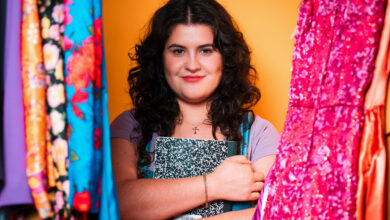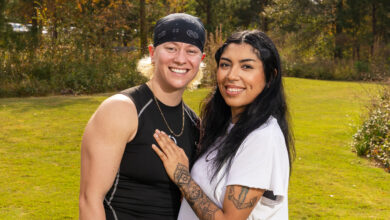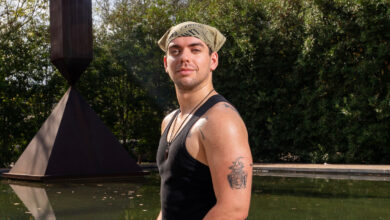
Intersectionality Trumps Hate
British LGBT group fights back against pinkwashed xenophobia.
By Josh Inocéncio
After the Pulse massacre, then-candidate Donald Trump announced he was an ally to the LGBT community and pledged to vanquish “Islamic radicalism” by closing our borders to Muslim refugees. As with many divide-and-conquer strategies in U.S. history, Trump sought—and still seeks—to exploit the fears of LGBT folk by crafting a false narrative that Muslim immigrants are putting them in danger of hate crimes.
Across the pond, the government of British prime minister Theresa May peddles a similar narrative to LGBT Brits as she seeks to undercut the UK’s refugee influx. One prominent British LGBT coalition, however, has resurrected a 1980s protest movement to thwart May’s claims. In 1980s Britain, amidst then-prime minister Margaret Thatcher’s crackdown on striking Welsh coal miners, a group of LGBT Londoners reached out to the miners by forming the group “Lesbians and Gays Support the Miners.” (The striking miners’ episode formed the basis for the Stephen Beresford’s 2014 film Pride, which won a Cannes Film Festival award that year.)
Now, in the wake of Europe’s ongoing immigrant crisis, a similar LGBT coalition calling itself “Lesbians and Gays Support the Migrants” has emerged, paying homage to the ’80s partnership as they seek to protect immigrants seeking refuge in the UK. Last month, I caught up with Morten Thaysen, a representative of Lesbians and Gays Support the Migrants. Here are some of the highlights of our conversation.
Josh Inocéncio: How does the historical legacy of Lesbians and Gays Support the Miners inform your group’s mission?
Morten Thaysen: LGSMiners stood in solidarity with mining communities against state repression and media demonization. We see very strong similarities to the situation in Thatcher’s Britain. Attacks on migrant communities are escalating, and we think the story of solidarity between communities from the 1980s is a very important story to tell and build on today.
In your group’s vision, how does being queer relate to “smashing borders”?
It’s been 50 years since homosexuality was decriminalized in the United Kingdom, but the British government still deems itself as fit to decide who is considered legal and illegal in our society—who is granted the right to live here, and those not afforded that privilege. Instead of raiding our LGBT+ venues and harassing queer people on the streets, the government is now engaged in the mass deportation of migrants in the UK seeking refuge—many of whom are LGBT. Officers might no longer be busting through the doors of underground [gay] bars, but they [are now] entering homes and communities, snatching people from their beds in the dead of night and forcing them into handcuffs to deport them to places where their lives might be in danger.
What specific government policies inspired the inception of the Lesbians and Gays Support the Migrants, and how did you form the group?
The group was formed just as the refugee “crisis” was hitting the front pages across Europe. At the same time, Theresa May (who was then the home secretary, not the prime minister) was driving a campaign of hate against migrants in the UK, declaring that she wanted to create a “hostile environment” for migrants. She was (and is still) succeeding. We have experienced the far right in Europe increasingly using “gay rights” as a weapon against migrants. The argument would be made over and over that closed borders were needed to protect us against homophobic foreigners. Co-opting decades of LGBT+ campaigning and activism and using it as a racist and xenophobic tool is completely unacceptable.
What are some strategies you’ve used to convey your message, and which ones have been the most effective?
We’ve used many different strategies over the past year and a half, from glitter-bombing corporate headquarters to burning fake money on a sacrificial fire. Our most recent events and actions have probably also been our most successful. One of them was at the Peckham Pride event, and the other one was when we joined forces with the Plane Stupid and End Deportations activist groups to blockade a mass-deportation charter flight at Stansted Airport, exposing the brutal practice of charter flights to the British public.
Tell us more about Peckham Pride and why you chose that LGBT event for your demonstration march.
This year’s Peckham Pride was a huge success, with hundreds of people marching through central Peckham to celebrate migrant and queer communities, and to show resistance to immigration raids. Peckham is home to a lot of migrant communities—for instance, people from Nigeria and Ghana—and is a really amazing and vibrant part of London. But the government is targeting those communities right now with immigration raids on shops and houses in an attempt to deport as many people as possible. Peckham Pride is a celebration of the people of Peckham and the resistance that we put up against government repression.
How has your movement shifted since the Brexit vote?
The UK is changing very rapidly right now, in a scary way. We’ve scaled up our actions as a response to that. I think our occupation at Stansted Airport was a bit of light in the dark for many people, on the morning that Theresa May [began the UK’s withdrawal from the European Union by invoking] Article 50.
What is your response to detractors who say allowing immigrants in from Muslim-majority nations only increases violence against LGBT Brits?
That is a claim based solely in Islamophobia, and it has no basis in the actual lived experience of LGBT+ people in the UK. Hate crimes are on the rise in the UK, both against Muslims and against LGBT+ people, and the people committing those hate crimes are all too often the very same people accusing Muslim communities of homophobia. No community is free of homophobia (or any other prejudice), but using this form of social-justice language to attack other minorities is unacceptable.
Are you aware of any U.S. chapters of Lesbians and Gays Support the Migrants? If not, how would U.S. LGBT activists go about forming one?
I don’t think there is a U.S. chapter. If anyone is interested, get in touch with us. Under Trump, it’s more important for people from different minority communities to come together and fight against repression [through intersectional coalitions].
In terms of defending immigrants, and in particular those from Muslim-majority nations, what else would you like our readers in Texas to know?
I’d say the most important first step is to reach out to communities under attack. Speak to them, organize with them, and form a powerful opposition to Trump and his policies. Solidarity is powerful, cooperation is powerful, and creativity is powerful. We need all of this to survive the coming years.
To find out more about Lesbians and Gays Support the Migrants, check out their Facebook page at facebook.com/lgsmigrants. To inquire about forming a U.S. chapter, email Morten Thaysen at lgsmigrants@gmail.com.










